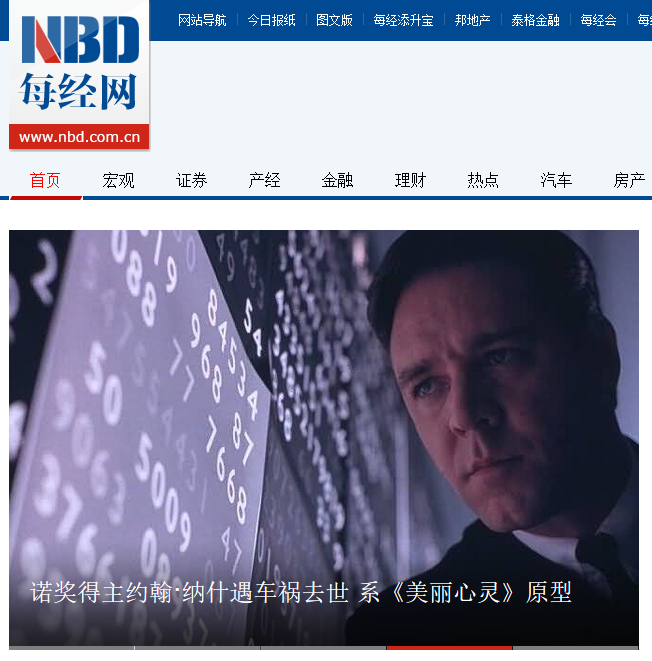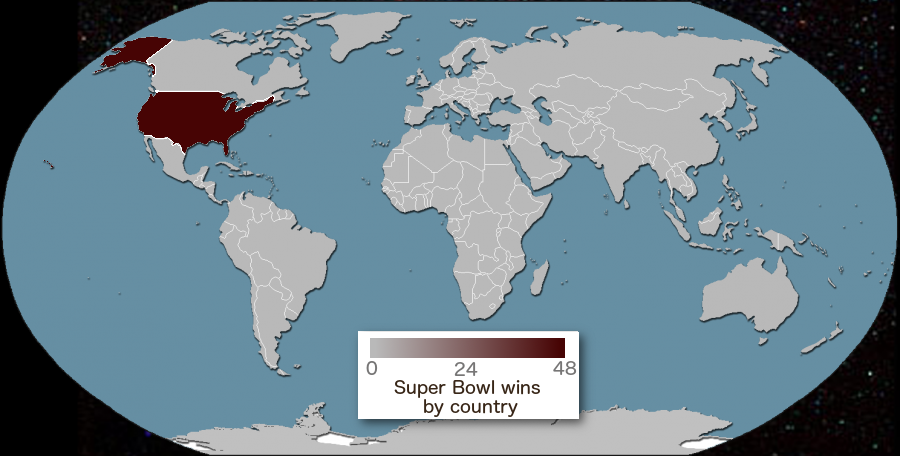纳什意外去世,不幸。
纳什了不起,一生也神奇,不过了解不深入,没什么多说的。只是见到此中文网站的头条,觉得也太土了:

媒体觉得纳什不是什么,电影才是真的。
世界各地皆如此,对比一下美国的傲慢:

ReCode To Vox
《华尔街日报》2015.05.31
South China Sea Buildup Benefits Asia, Says Beijing
Adm. Sun Jianguo 孙建国 notes military usefulness of islets China is constructing in the disputed Spratlys, but cites search and rescue, disaster relief and research as main interest

Adm. Sun Jianguo, deputy chief of the general staff of the People's Liberation Army of China, spoke about China’s island-building in the disputed Spratly Islands at the Shangri-La Dialogue security summit in Singapore
SINGAPORE—A senior Chinese naval commander has claimed new islands his country is building in the South China Sea will benefit the region, while stressing that such activities “fall well within the scope of China’s sovereignty.”
Noting the military usefulness of the islets China is constructing in the disputed Spratly Islands, Adm. Sun Jianguo, deputy chief of staff of the People’s Liberation Army’s general staff, said they would mainly enable China to provide “international public services,” including maritime search and rescue, disaster relief, and scientific research.
“There is no reason for people to play up the issue in the South China Sea,” Adm. Sun said on Sunday at the Shangri-La Dialogue security summit in Singapore, where discussions involving regional defense ministers and military top brass have been completely dominated by the implications of China’s island-building program. The new islands “do not target any other countries, or affect freedom of navigation,” he said.
The Philippines and other Southeast Asian countries have expressed alarm at the speed and scope of Chinese reclamation activities.
Malaysian armed forces chief Gen. Zulkifeli Mohd. Zin said Sunday that China should do more to explain its actions and intentions in the South China Sea, after Adm. Sun dodged questions on the subject. “We do not know what they are trying to do,” Gen. Zulkifeli said, referring to Beijing’s island-building activities. “It would be good if China can come out publicly and announce what they are doing so that they can be seen to be more transparent.”
But he also welcomed China’s willingness to keep engaging with rival claimants. “I’m reassured by what (Adm. Sun) said because he said China would continue to work on the Code of Conduct—that means China has not rejected that,” Gen. Zulkifeli said. “It is up to Asean (the Association of Southeast Asian Nations) and the claimant states to help them to do this.”
Adm. Sun struck a nonconfrontational tone as he defended China’s recent track record in the disputed sea, making no reference to U.S. Secretary of Defense Ash Carter’s recent criticisms of China, including remarks last week that China is “out of step with internal norms” in forging ahead with its island-building program despite the objections of its neighbors.
In Singapore yesterday, Mr. Carter called on all South China Sea claimants to halt land reclamation activities immediately. He also asserted that U.S. military forces would exercise their right to freedom of navigation in the South China Sea, and would ignore any Chinese orders to vacate areas surrounding the newly-built islands.
But Chinese military officers attending the summit, which is organized annually by the International Institute for Strategic Studies, a U.K.-based think tank, felt yesterday that Mr. Carter had been relatively mild in his criticism of China, and Adm. Sun’s speech suggested there was little appetite for a China-U.S. confrontation at this year’s event. The exchanges between U.S. and Chinese representatives had been far more acerbic at the 2014 summit.
Instead, Adm. Sun limited himself to warning other countries against “making irresponsible remarks based on one’s own subjective preferences,” and advised China’s smaller neighbors to “refrain from hijacking regional security for selfish gains.”
He also said that China may set up an ADIZ, or air defense identification zone, in the disputed region. “Whether we will establish an ADIZ in the South China Sea will depend on whether our maritime security will be threatened,” he said.
Adm. Sun didn’t answer a string of questions about whether Chinese rhetoric about seeking win-win scenarios in the South China Sea really matched China’s behavior on the ground, disappointing observers who felt that he had wasted an opportunity to explain Chinese intentions.
“It was not the performance of a rising power that wants to be seen in this region as competing positively,” said Bonnie Glaser, senior adviser for Asia at the Center for Strategic and International Studies, a U.S. think tank. “There were a lot of concerns expressed [about China’s activities] here this weekend. If nothing else, the Chinese need to begin answering questions, to engage the region, and they’re failing to do so. They will be very heavily criticized for that.”
【新民周刊 】
派德运动:韩国经济起飞的第一桶金
日期:2015/5/13
詹小洪
如今的韩国,人均GDP接近3万美元,外汇储备高达3700亿美元,为世界第六大外汇储备国,已然为一中等经济强国。然而在半个世纪前的60年代初,韩国还是极贫困的国家,人均GDP不到100美元,穷得连饭都吃不饱。
要搞建设,资金奇缺,不得不向中东输出建筑劳务、应美国要求被迫向越南派遣军队参加越南战争,以获取宝贵的外汇。另外还通过政府间的协议,韩国向当时的西德派出过数以万计的矿工和护士,史称“派德运动”。正是这个“派德运动”为韩国的工业化乃至经济起飞,掘得了第一桶金。
朝鲜战争刚结束的60年代初,韩国人口2400万,全国200人以上的企业只有54家,失业人数达240万,很多大学毕业生都找不到工作。在煤矿,竟有24%的矿工是大学生,50%以上是高中生。医院大量护士和护理人员也失业。而这时的西德劳动力紧缺。1961年12月,韩德两国签订《经济技术援助协定》,西德以政府和商业贷款的形式援助韩国,韩国则派遣矿工和护士到西德工作,说白了就是当廉价劳动力。在这种情况下,派德运动是缓解失业和赚取外汇的突破口,也成了韩国人大规模劳务输出的首例。
1963年12月21日,作为派遣到西德的首批矿工,123名韩国人离开了汉城金浦机场前往西德的鲁尔工业区矿山。要想成为派德矿工中的一位可不容易,他们是在700多人的竞争中脱颖而出的,报名者中不乏名牌大学毕业生,甚至有中途退学的大学生。当时韩国的主流报纸就像今天公布司法考试金榜题名者一样纷纷登出了他们的名单。因大学毕业生占录用者的20%,他们被称为“绅士矿工”。
根据合同,韩国矿工一周工作5天,每天8小时,地上作业者的收入在1964年为每天20.20马克,地下为30-39马克。有矿工回忆说:“我们在潮湿狭小的矿井里干活,有不少人在用炸药炸矿时送了命。”而当西德员工坐在酒吧里休闲时,韩国矿工的业余生活却只有在宿舍旁边的空地踢一踢足球。尽管如此,在工业化萌芽时期,162.5美元的月薪足以让他们付出艰辛的劳动。
韩国政府在这个时期还将护士派遣到德国工作。据派德韩国护士回忆,她们每天工作在9小时以上,休息时间通常得不到保证。以1972年为基准,月薪为281.50马克。她们凭借对年老患者的精心看护和熟练快速的工作能力赢得了西德人的好评。她们甚至在西德医院里承担清洗尸体的工作。
据韩国国家统计厅资料,1963-1977年,韩国共向西德派出54批次,7936名矿工, 11057名护士。最多的1973年,西德有6000多名韩国护士。据韩国媒体报道,派德韩国员工往往将收入的80%寄回家,这不仅为韩国提供了宝贵的外汇,还激发了韩国国民“克己精进”的热情,成为创造“汉江经济奇迹”的巨大精神动力。据统计,在派德运动期间,韩国矿工和护士年均创汇5000万美元,占派德初期韩国GNP的2%。
1964年12月10日,访问西德的韩国总统朴正熙夫妇在鲁尔地区的汉博恩煤矿公司大礼堂接见了300名韩国矿工和护士,由矿工组成的乐队演奏韩国国歌时,与会者因哽咽无法再唱下去,朴正熙总统说:“即使我们看不到,我们也要为子孙后代打下繁荣的根基……”此时演讲中断了,因为充斥现场的哭声让总统夫妇和随行人员也都泣不成声。
派德运动中,恶劣的工作生活条件,低下的收入,屈辱的待遇,使不少韩国劳工离开了德国。据报道,1966年,发生了首批中去西德的韩国护士就有不少偷渡到美国和加拿大,1969年又有231名韩国护士偷渡到第三国。1967年7月还发生了韩国矿工集体经东柏林投奔朝鲜的事件。
韩国向西德派遣的矿工和护士中,60%的人选择留在西德或移民北美,7983名矿工,如今只剩下了1250名定居在德国。
新消费系列报告一:这样的消费大潮你怎能错过?
新消费系列报告二:从大众到个性:日本消费的百年变迁
中国经济的另一面:大众消费时代到来
|